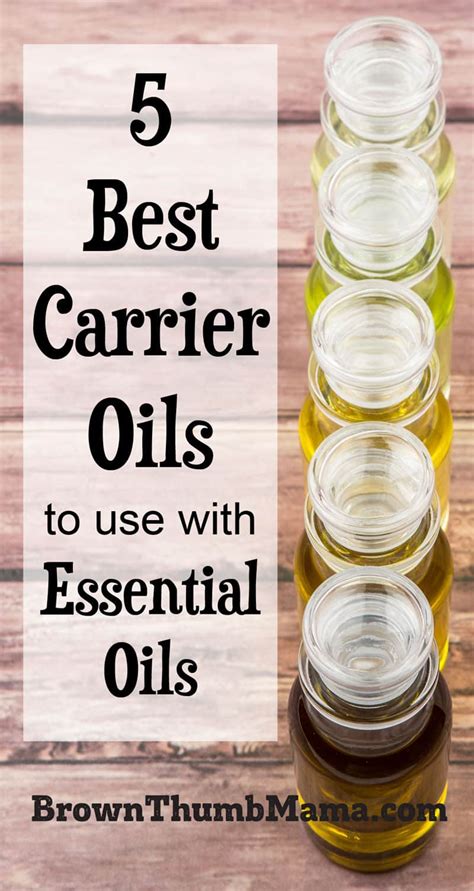Carrier oils are clear or slightly colored liquids derived from vegetable sources, such as olive oil, coconut oil, or jojoba oil. They are called “carrier” oils because they are the medium through which essential oils are diluted before topical application to the skin.

Unlike essential oils, which are highly concentrated and can cause irritation if not diluted, carrier oils are gentle and non-irritating, making them an excellent base for mixing essential oils. They also help essential oils absorb into the skin more easily.
Choosing the Right Carrier Oil
The best carrier oil for you depends on your skin type, the specific essential oils you are using, and your desired results. Here’s a quick guide to selecting a carrier oil:
- Oily skin: Choose a lightweight carrier oil like jojoba oil or grapeseed oil to prevent clogging pores.
- Dry skin: Opt for a heavier carrier oil like olive oil or coconut oil to provide deep hydration.
- Sensitive skin: Choose a gentle carrier oil like almond oil or avocado oil to minimize irritation.
Benefits and Uses of Carrier Oils
Carrier oils offer numerous benefits and uses, both alone and in combination with essential oils:
Benefits
- Hydrating: Carrier oils are rich in fatty acids and antioxidants, making them nourishing and moisturizing for the skin.
- Soothing: Carrier oils can help soothe inflamed or irritated skin, reducing redness and itching.
- Anti-aging: Some carrier oils, such as rosehip oil and argan oil, contain high levels of antioxidants that help protect the skin from environmental damage.
- Antimicrobial: Certain carrier oils, including coconut oil and tea tree oil, possess antimicrobial properties that can help fight skin infections.
Uses
- Skin care: Carrier oils are commonly used to create DIY skincare products such as body lotions, facial serums, and massage oils.
- Massage: Carrier oils are the base for massage oils, providing a smooth, glide-on sensation and nourishing the skin.
- Hair care: Carrier oils can be incorporated into hair masks and treatments to moisturize and strengthen hair.
- Aromatherapy: Carrier oils can be used in diffusers or burners with essential oils to create a relaxing or invigorating atmosphere.
Table 1: Popular Carrier Oils and Their Key Benefits
| Carrier Oil | Key Benefits |
|---|---|
| Almond oil | Rich in vitamin E and antioxidants; suitable for all skin types |
| Argan oil | High in vitamin E and fatty acids; anti-aging and moisturizing |
| Avocado oil | Rich in vitamins A, D, and E; nourishing and soothing |
| Coconut oil | Antibacterial and antifungal; moisturizing and conditioning |
| Evening primrose oil | Rich in gamma-linolenic acid; anti-inflammatory and nourishing |
| Grapeseed oil | Rich in antioxidants and polyphenols; lightweight and non-greasy |
| Jojoba oil | Very similar to the skin’s natural oils; suitable for all skin types |
| Olive oil | High in squalene and antioxidants; moisturizing and protective |
| Rosehip oil | Rich in vitamin C and antioxidants; anti-aging and brightening |
| Tea tree oil | Antibacterial and antifungal; helpful for acne and skin infections |
Diluting Essential Oils with Carrier Oils
To use essential oils safely and effectively, it is essential to dilute them with a carrier oil before applying them to the skin. The recommended dilution ratio varies depending on the essential oil and the intended use.
How to Dilute Essential Oils
- Determine the appropriate dilution ratio for the essential oil(s) you are using. For example, a 2% dilution ratio means using 2 drops of essential oil per 10 ml of carrier oil.
- Measure the desired amount of carrier oil into a small container.
- Add the essential oil(s) and stir or shake well to mix thoroughly.
Table 2: Essential Oil Dilution Ratios
| Use | Dilution Ratio |
|---|---|
| Facial application | 1-2% |
| Body application | 2-5% |
| Massage | 3-10% |
| Diffusion | 1-3% |
Note: Always do a patch test on a small area of skin before using a new essential oil or carrier oil blend.
Creative New Word for Generating Ideas: “Oleationization”
“Oleationization” is a term we coined to describe the process of using carrier oils to extract and amplify the benefits of essential oils. By combining carrier oils with essential oils, we can create customized blends that address various skin concerns and enhance overall well-being.
Table 3: Oleationization Ideas
| Concern | Carrier Oil | Essential Oil(s) |
|---|---|---|
| Dry skin | Olive oil or coconut oil | Lavender oil, rose oil, chamomile oil |
| Oily skin | Jojoba oil or grapeseed oil | Tea tree oil, lemon oil, rosemary oil |
| Sensitive skin | Almond oil or avocado oil | Calendula oil, chamomile oil, tamanu oil |
| Anti-aging | Argan oil or rosehip oil | Frankincense oil, myrrh oil, sandalwood oil |
| Hair growth | Coconut oil or castor oil | Rosemary oil, peppermint oil, lavender oil |
Table 4: Carrier Oil Shelf Life and Storage
| Carrier Oil | Shelf Life | Storage Conditions |
|---|---|---|
| Almond oil | Up to 1 year | Store in a cool, dark place |
| Argan oil | Up to 2 years | Store in a cool, dark place |
| Avocado oil | Up to 6 months | Store in the refrigerator |
| Coconut oil | Up to 2 years | Store in a cool, dark place |
| Evening primrose oil | Up to 1 year | Store in the refrigerator |
| Grapeseed oil | Up to 1 year | Store in a cool, dark place |
| Jojoba oil | Up to 2 years | Store in a cool, dark place |
| Olive oil | Up to 1 year | Store in a cool, dark place |
| Rosehip oil | Up to 1 year | Store in the refrigerator |
| Tea tree oil | Up to 2 years | Store in a cool, dark place |
Note: Always refer to the manufacturer’s instructions for specific storage guidelines.
Conclusion
Carrier oils are versatile and beneficial natural substances that play a vital role in diluting and enhancing the effects of essential oils for topical applications. By choosing the right carrier oil for your specific needs and combining it with essential oils, you can create customized blends that address various skin concerns and promote overall well-being.
